V.O. Diedlaff's Blog
October 29, 2018
What’s on your mind?
"@Michael I apologize. I erroneously believed you were equivocating about the meanings of "projection" and "prediction". I can see now you were being precise instead. I believed you to be misinformed, but now I can see that your position is highly nuanced. I can also see that you care about the environment. However, I feel I was unfairly labeled a troll. It's true that I do troll social media looking for writing prompts. However, I try to keep my comments polite, but admit to occasional snark. In this case, I addressed my assumptions about a person without actually knowing the person. I'll pick up the rest of what I have to say on my blog."
 PART ONE
PART ONEThat's the trouble with social media. You're really talking to people you don't know. It's easy to fall into tribalistic tendencies. And that's what people seem to be doing. Social media is like high school all over again. Thoughts tend not to be addressed at deep levels, and people fall into habits of using cheap shots and poor arguments. An article in Scientific American discussed the difference between arguing to win and arguing to collaborate. It's the first type of argument that has taken over social media.
I find myself wondering what goes on in people's minds. I try to be objective but what I believe to be true, other people believe to be false. I know why I believe those things to be true, but I can't understand why others don't come to the same conclusions that I do. I suspect that they are being misled. I even suspect a certain social classes or political groups of misleading people. Am I a conspiracy theorist? I don't think so. But, I haven't found any other explanation, so I'm still looking. I realize now that I' won't learn how people think on social media. Here, the desire to belong to a group, to impress others, to be clever or cruel, seems to rule.
PART TWO In my book, We Can Fix It: Reclaiming the American Dream I argue that American inaction on climate change is largely a result of class warfare. That's a bold assertion to make I know, but decide for yourself by downloading the book for free through Apple, Barnes & Noble, or Smashwords. If you want it from Amazon there's a price (Their rules, not mine).
I won't discuss that topic now. Instead let's discuss one of my conspiracy theories. First I'll tell you my biases. I believe that humans cause climate change just as much as I believe that humans hunted mastodons to extinction. I believe that Easter Islanders denuded their islands of vegetation prior to ending their days knocking over big stone heads. Since I also believe that the Japanese learned to manage their forests rather than denude them, I believe we should manage climate change rather than dither-about denying it. To do so effectively will require a massive amount of human cooperation and will. Without cooperation and will, other resolutions to humanity's problems will result in far more more human misery.
Climate can change for a variety of reasons. I take on faith that human activity is the main cause of current climate change. Climate science is complex and I'm no expert. I believe what I do because what I've seen matches my general science knowlege. For example, when I watch Neil Degrasse Tyson discuss climate change in his Cosmos episode on Venus, it fits with other things I know about science. On the other hand, when I hear somebody call Neil Degrasse Tyson a shill, I wonder who he is shilling for and why they put so much energy into making false claims. In my view, climate change denialists use arguments that don't carry much weight. They've put money, rather than effort, behind their claims.
I also take on faith that humanity has both the technology and the ability to reduce the effects of climate change. We can't stop what's happened or what's going to happen, but we can certainly slow it down and adapt to it. What we can't do, is ignore it. Doing so would result in calamities far greater than the inconveniences we'll face if we put our efforts into tackling climate change now.
Technology and ability aren't enough however. A firm will and cooperation are required tools as well. At the moment these tools are in short supply amonst human societies. But I think attitudes can change.
Historian, Walter Sheidel writes about social collapse in his 2017 book. He shows how hunting and gathering societies must cooperate to survive. People in such societies own little besides clothing and tools. Once people began farming and herding, surpluses developed. Where there are surpluses, humans tend to create hierarchy, one result of which is Capitalism. People in such societies own few possessions other than clothing and tools. Once people began learning to farm and herd, surpluses are able to develop. Where there are surpluses, humans tend to create hierarchy, one result of which is Capitalism.
Sheidel notes that survival level societies are less innovative than hierarchical ones. Indeed, innovation was one of the advantages of our Capitalist society. During the Cold War, this advantage was promoted in public service announcements which claimed that Capitalism is superior to Communism because it encourages competition resulting in innovation and greater choice for consumers.
Now that communism is not considered the threat it once was, it might be worth considering what can be accomplished with cooperation. I believe when societies become overly hierarchical, power bottle-necks competition and opportunity, and causes poverty and ill-health. Where hierarchy was once an advantage, now it gives diminishing returns. As more and more wealth and power is held by fewer and fewer people, competition and innovation must diminish as well.
In any case it's time for my conspiracy theory. Most Americans haven’t seen significant wage increases since the early 1980s. However those in the top 20 percent have found life fairly easy. One thing, there's what, eight billion people on the planet now? Fixing the climate will mean sacrifices, and even if we make them, what will we do about all the people?
I remember a biology class experiment with two fruit fly couples. We put them in a closed environment, gave them plenty to eat and drink, and let them do their thing. They reproduced and then they reproduced some more. Soon there were generations of fruit flies living in a little closed dish. Then a couple of them died. And then they all died. They befouled themselves. Their garbage killed them. Like us — we’re getting plastic into everything. It's in shellfish. It's in fish. It's in us. So even if we start fixing the climate, we’re still drowning ourselves in our own garbage. What if Ebola or something killed most of humanity, then we wouldn’t have to do anything about climate change? If we just sit back and distance ourselves from the rabble then maybe they’ll all kill themselves and solve the problem for us. And if a poor girl like me can have such a thought, imagine what wealthy people think. They’ve got more to lose than me, nicer houses, nicer cars, etc. (actually nannies like me just have school debts, not cars and houses).
And even for people who aren’t wealthy, trying to wrap your mind around all the problems humanity currently faces is enough to wish humanity extinct, mostly. Naturally one would want a few people around and if one were rich, hung out with the cool kids, or had insider knowledge about the conspiracy, one might be able to avoid personal catastrophe oneself. But it doesn’t need to be a conspiracy, there are other ways to deny climate change. But I think it’s time to face up to it. If we work together we can handle this. Or die trying.

Published on October 29, 2018 18:01
October 19, 2018
Another social media climate debate
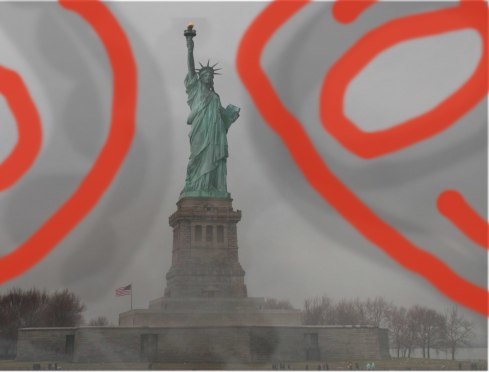 He says it's a hoax. I ask, "How do you know?" He tells me it's a matter of logic and of looking at raw data, like my thermometer.
He says it's a hoax. I ask, "How do you know?" He tells me it's a matter of logic and of looking at raw data, like my thermometer.I respond: You're telling me to trust raw data like the thermometer outside my window. But that's naive. Small samples of data prove nothing. Climate change data is gathered by interdisciplinary teams looking at ice cores, tree rings, satellite and historical data, etc. Did y
ou know that 97 percent of peer reviewed science articles support the climate conclusions you doubt. When you say you're being logical, I suspect it's the logic of a conspiracy theorist who reasons that it must be true because it's only believed by the three percent who know what's really happening.
Then there's another fellow who agrees with the first. He says the conjecture that, "climate change will reach a tipping point by 2030," claiming, "This is speculation based on computer model projections (not predictions), based," on unproven scientific hypothesis.
I reply: Aside from the fact that projections and predictions are more or less the same thing, I must agree that these assumptions have not been scientifically tested through experiment. It's a little difficult wrapping an experiment around an entire world climate. The argument is always present, and always valid, that correlation does not equal causation. However the evidence responsible for putting those warning labels on cigarette packages was largely correlational. Sometimes one can't have the best forms of proof. And on those occasions, projections, or predictions if you prefer, are what we fall back on. I don't mind if you wait until you have sufficient proof of climate change. But please wait on some other planet, because some of us here would like to take reasonable precautions.
But in replying so, I fail to address the underlying issue which is that the prediction comes from an arm of the United Nations "which seeks to bring less developed nations up to the material cultural level of developed nations, and seeks way to force developed countries to pay to reduce the disparity. This ignores the fact that the Earth cannot sustain 7-8 billion people living at the standard of living of the United States and some European countries."
So really it's an out-of-pocket issue. There's no way the earth can keep these billions of people living at a standard similar to that of the United States and a few other countries. So I don't get it here. What you're saying then is that you won't make an out-of-pocket sacrifice and so the earth will get hot because you won't share with poor people. Right?
But you don't even know what's being asked of you yet. Perhaps there are blessings in disguise. Yes, you may have to make a few sacrifices. In fact we should all be making those sacrifices. But it's just a collection of little things, like using paper instead of, plastic drinking straws, or better yet not throwing shit in streams. There is much that must be done to make our environment sustainable. Without your cooperation we are already making great strides in renewable energy. With your cooperation we could go further faster. I think there's an unstated argument here. You believe things should stay exactly as they are. The problem is nothing ever stays as it is. Citizens in developed nations live excessively. Exporting our excesses through a process of globalization doesn't help any. Yes, it's simply too bad that things can't stay the way they are. But that doesn't mean they can't be great up ahead. If eating less meat sounds like a bad thing, maybe it's because you haven't tried it yet or thought about lowering your cholesterol. The point? Don't fear change. Embrace it.

Published on October 19, 2018 12:03
August 25, 2018
Go forth and propagate
 All last year whenever anyone asked what I was writing I said it was a propaganda piece. Lately I’ve been trying to begin a first novel and it’s not quite coming together, but if you ask me what I’m writing, I’d still have to say it’s a propaganda piece.
All last year whenever anyone asked what I was writing I said it was a propaganda piece. Lately I’ve been trying to begin a first novel and it’s not quite coming together, but if you ask me what I’m writing, I’d still have to say it’s a propaganda piece.I don’t seem to be making it as a writer, despite all the classes I took and loans I took out. But I keep writing instead of looking to upgrade my skills to something more lucretive. I’ve been trying to figure out why, and I guess George Orwell said it best. He said that “... every novelist, has a ‘message’, whether he admits it or not, and the minutest details of his work are influenced by it. All art is propaganda. Neither Dickens himself nor the majority of Victorian novelists would have thought of denying this.” So I guess my job is to go forth and propagate. Funny, I never thought of myself as a propagandist.

Published on August 25, 2018 15:33
April 16, 2018
Democracy repair kit
FREE download
ibooks
Barnes & Noble
Kobo
Smashwords
Kindle pre-order
Paperback
Reviewers Edition
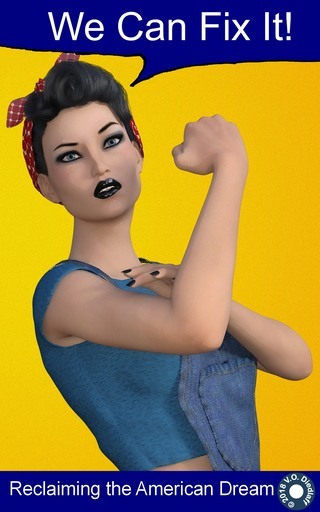 In the game Monopoly the winner is the one with the most money. The other players are broke, or nearly so. In real life, the share of America’s wealthiest has grown, while 80 percent of its citizens increasingly struggle with economic uncertainty. Among developed nations, American income inequality ranks close to the top. Extreme inequality threatens Americans’ welfare, their environment and even their democracy.
In the game Monopoly the winner is the one with the most money. The other players are broke, or nearly so. In real life, the share of America’s wealthiest has grown, while 80 percent of its citizens increasingly struggle with economic uncertainty. Among developed nations, American income inequality ranks close to the top. Extreme inequality threatens Americans’ welfare, their environment and even their democracy.
The American dream of opportunities for all has been hijacked by, “large corporations, Wall Street, and very wealthy individuals,” claims Robert Reich. Additionally, such conditions are, “no more in their interest than in the interests of the rest of the population, because under such conditions an economy and a society cannot survive.”
Our country is ailing, but we can fix it. This quick-reading, yet enlightening, book tells how our democracy broke, explains our current peril, and shows how we can restore American democracy to our people.

ibooks
Barnes & Noble
Kobo
Smashwords
Kindle pre-order
Paperback
Reviewers Edition
 In the game Monopoly the winner is the one with the most money. The other players are broke, or nearly so. In real life, the share of America’s wealthiest has grown, while 80 percent of its citizens increasingly struggle with economic uncertainty. Among developed nations, American income inequality ranks close to the top. Extreme inequality threatens Americans’ welfare, their environment and even their democracy.
In the game Monopoly the winner is the one with the most money. The other players are broke, or nearly so. In real life, the share of America’s wealthiest has grown, while 80 percent of its citizens increasingly struggle with economic uncertainty. Among developed nations, American income inequality ranks close to the top. Extreme inequality threatens Americans’ welfare, their environment and even their democracy.The American dream of opportunities for all has been hijacked by, “large corporations, Wall Street, and very wealthy individuals,” claims Robert Reich. Additionally, such conditions are, “no more in their interest than in the interests of the rest of the population, because under such conditions an economy and a society cannot survive.”
Our country is ailing, but we can fix it. This quick-reading, yet enlightening, book tells how our democracy broke, explains our current peril, and shows how we can restore American democracy to our people.

Published on April 16, 2018 13:57
March 24, 2018
Maybe this time we can fix it
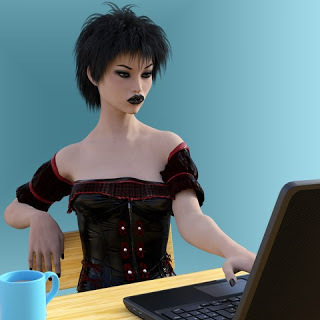 Because, it’s different this time. This time the victims are fighting back. Hearts and prayers are no longer a sufficient response. Less than six weeks after Nikolas Cruz unleashed a Valentine’s Day massacre in Parkland, Florida, the state’s gun laws have already changed.
Because, it’s different this time. This time the victims are fighting back. Hearts and prayers are no longer a sufficient response. Less than six weeks after Nikolas Cruz unleashed a Valentine’s Day massacre in Parkland, Florida, the state’s gun laws have already changed.It’s sad that so many students died before one group of survivors channeled their grief into political action. But it’s glorious that American young are stepping up to insist upon what their elders have failed to achieve. And it couldn’t come at a better time.
Washington is a circus now, a dark and dangerous one. While most Americans are either brainwashed or paralyzed with fear, toadying sycophants delude themselves thinking they can restrain the dangers they’ve unleashed. This does not bode well for democracy. There are problems, grave problems, that the circus isn’t addressing.
Assuming all else goes well, that the government doesn’t implode or the world doesn’t explode, by the time the youngest millennial graduates college, many of the two-thirds of his peers who didn’t attend college will be losing their jobs to robots. Vital economic issues are either not being addressed, or addressed only with voodoo economics and naivete.
Our government responds to the desires of moneyed interests while ignoring the needs of the four fifths of the people who share only ten percent of the nation’s wealth. The baby boom generation coined the phrase, “Don’t trust anyone over thirty.” They proved the adage by failing to nourish democracy. America badly needs a wake-up and a shake-up. If American youth refuses to become victims, they must fight—and fight hard. God bless them. With their help we can see this job through. I know this—if we work together we can fix and reclaim our democracy.
We Can Fix It! Reclaiming the American dream is FREE this spring
ibooks
Barnes & Noble
Kobo
Smashwords

Published on March 24, 2018 13:12
March 11, 2018
The back story
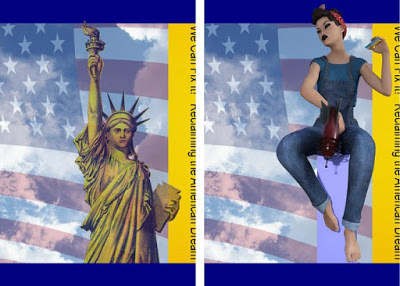 Now that I've launched the eBook, I've begun thinking about the summer release on Amazon and in paperback. I've been working on the back cover. Originally I wanted to do something with the Norman Rockwell version of Rosie the Riveter. But, when you work with 3D models you've got to use what you've got. The real Rosie has a rivet gun across her lap. The fake Rosie has a blowout in her clothing. I posed the retro ray gun to conceal the blowout. However people said it looked rude. So, Rosie stepped out and Ms. Liberty stepped in.
Now that I've launched the eBook, I've begun thinking about the summer release on Amazon and in paperback. I've been working on the back cover. Originally I wanted to do something with the Norman Rockwell version of Rosie the Riveter. But, when you work with 3D models you've got to use what you've got. The real Rosie has a rivet gun across her lap. The fake Rosie has a blowout in her clothing. I posed the retro ray gun to conceal the blowout. However people said it looked rude. So, Rosie stepped out and Ms. Liberty stepped in.Download We Can Fix It while it's still FREE
ibooks
Barnes & Noble
Kobo
Smashwords

Published on March 11, 2018 13:22
February 28, 2018
Sunday morning chat
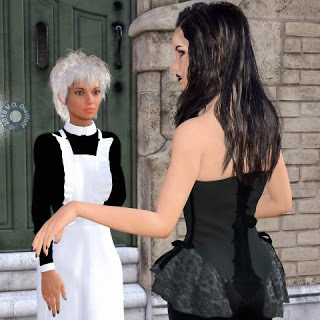 This morning, the parents took the twins to Sunday School. I stayed home on religious grounds. I claimed I was a Buddhist. I wasn't, but Junjie was. It didn't matter. They took advantage of me. You grasp hold of whatever advantages you can. Junjie taught me that.
This morning, the parents took the twins to Sunday School. I stayed home on religious grounds. I claimed I was a Buddhist. I wasn't, but Junjie was. It didn't matter. They took advantage of me. You grasp hold of whatever advantages you can. Junjie taught me that.Malik was good with the kids anyway. So it didn't matter too much if I wasn't there. Not that the parents weren't capable of dealing with them. They just didn't like the bother.
I had a feeling Brook would be done about now so I walked over to the Holder estate. I saw him through the solarium window as I approached. He was just getting out of his chair. I stayed out of sight. I don't think he cared for me. I waited until he'd left before I approached the solarium. Brooke signaled me to enter as she unlatched the solarium door before carrying the breakfast tray to the kitchen. She smiled as she served me coffee. But then I began to notice she had the wrinkle in her eyebrow and that frown she gets at the corners of her mouth. “Did he do it again?” I asked.“Last night, she said. And then he threatened to fire me.”“He threatens you lot doesn’t he?”“Almost constantly. I guess it's part of the job. How are you doing?”“Oh, I met up with another writer. I’ve been collaborating.”“On that dystopian novel you were telling me about?”“No. This is something new. It’s about economics and neuropsychology, I guess.”“You don’t know?”“No, Daffi says he’ll explain it as we go.”“Daffi?”“That’s what he calls himself.”“Weird.”“Even weirder, he says we’ll make a fortune by publishing on Smashwords.”
To be continued

Published on February 28, 2018 09:59
February 12, 2018
Horrors
 "The most merciful thing in the world, I think, is the inability of the human mind to correlate all its contents. We live on a placid island of ignorance in the midst of black seas of infinity, and it was not meant that we should voyage far. The sciences, each straining in its own direction, have hitherto harmed us little; but some day the piecing together of dissociated knowledge will open up such terrifying vistas of reality, and of our frightful position therein, that we shall either go mad from the revelation or flee from the light into the peace and safety of a new dark age."
"The most merciful thing in the world, I think, is the inability of the human mind to correlate all its contents. We live on a placid island of ignorance in the midst of black seas of infinity, and it was not meant that we should voyage far. The sciences, each straining in its own direction, have hitherto harmed us little; but some day the piecing together of dissociated knowledge will open up such terrifying vistas of reality, and of our frightful position therein, that we shall either go mad from the revelation or flee from the light into the peace and safety of a new dark age."I think H. P. Lovecraft got it wrong. The mind has a wonderful ability to build maps of the world. We can expand those maps, building models of what we cannot see. We can bend our thoughts in all sorts of useful directions while drawing from a variety of inner resources. What we cannot do is see the world as it is, for the world doesn't exist until our eyes see it and our brain models it. But it's a mistake to believe that only one's own world is real or that what you do in the real world has no consequences.

Published on February 12, 2018 09:01
January 15, 2018
It's your choice
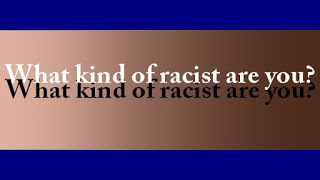 Are you a racist? I know I am. Behavior scientists have discovered that people have implicit bias that colors their reactions below the level of conscious awareness. This is what makes me clutch my purse more tightly when I pass an other-race stranger on the sidewalk at night. I shouldn’t—my good friend Malik is of another race. But I react this way anyway. Of course, Malik is a friend, not a stranger, but just the same …
Are you a racist? I know I am. Behavior scientists have discovered that people have implicit bias that colors their reactions below the level of conscious awareness. This is what makes me clutch my purse more tightly when I pass an other-race stranger on the sidewalk at night. I shouldn’t—my good friend Malik is of another race. But I react this way anyway. Of course, Malik is a friend, not a stranger, but just the same …It’s like a reflex how we initially react to strangers who don’t look like ourselves. Just as I’d move my finger away from a candle flame, I clutch my purse more tightly near an other-race stranger. It may not be me, but it’s what I do. It’s the way my brain was designed. I like to think of myself as being in charge but the reality is there are many viewpoints in my brain and they are constantly competing to express themselves, and occasionally a viewpoint wins the argument and acts without my even being aware of it.
Why? According to William Wan and Sarah Kaplan writing in the Washington Post, “’An us-them mentality is unfortunately a really basic part of our biology,’ said Eric Knowles, a psychology professor at New York University who studies prejudice and politics. ’There’s a lot of evidence that people have an ingrained even evolved tendency toward people who are in our so-called 'in group.’But how we define those groups, and the tendency to draw divisions along racial lines, is social, not biological, he added. ’We can draw those lines in a number of ways that society tells us,’ he said.”
I learned in church to, “Judge not according to the appearance, but judge righteous judgment.” That’s John 7:24. I’d like to think my judgement was righteous, but I know it isn’t always. But that’s not my fault. It’s the way I was wired.
But there’s still hope for me. I may always clutch my purse more tightly when I see an other-race stranger, but I can behave differently in situations where I know I’m safe. So it’s really not so much about my being a racist—we all are—it’s about how I choose to act despite my racism. Spiritually I’m made in God’s image, but physically I have an animal nature. I can use the free-will God gave me to challenge myself to be a better person instead of acting on the emotional animal impulses and viewpoints that compete for control of my behavior. That side is always there trying to convince me to hate and fear those who don’t look the same, even though both God and science teach that there’s no difference between people. Sometimes it’s a struggle, but I want to do what’s right. Sometimes the racist arguments are convincing, but they always fall apart when I look more closely.
I know who I want to be. Now let me ask you, what kind of racist do you want to be—the kind who fights implicit bias, or the kind who indulges it?

Published on January 15, 2018 13:52
December 22, 2017
Entitlements
I hate the first day of winter. That was the day my older sister could no longer stay at home and had to go back to the hospital. She had done so much for me—helped me get through school. I had debt to be sure, plenty of it, but without her help I couldn't have made it at all.
 Really she was the smarter of the two of us, but she chose not to go to college because she knew how bad I wanted to go. She'd always treated me that way. God, how how I miss her. I miss her so bad when winter arrives.
Really she was the smarter of the two of us, but she chose not to go to college because she knew how bad I wanted to go. She'd always treated me that way. God, how how I miss her. I miss her so bad when winter arrives.
She was never one to get sidetracked—always knew her goals and wouldn't let anything stop her. Until she got ill. She insisted on working up until the very end. And she sent me school money even though I begged her not to because I knew she didn't have it. But finally it was too much for her and she couldn't work anymore.
If she'd seen a doctor earlier she'd be alive today. But she held off for so long because she couldn't afford insurance that now it was too late to save her. She didn't like the idea of begging, but I insisted that she get Medicaid. I even helped her apply for it. I'm glad I did. It was one less thing for her to worry about in those final days. She was glad she didn't have to burden her husband with debt as well as a child to raise by himself.
They call them entitlements. But I consider them small mercies. But if people like my sister were paid better, and could afford insurance, these small mercies wouldn't be as necessary. Or, I guess if we had universal healthcare, then low pay would be more tolerable. But they say that's socialism, even though a lot of developed countries have it. I recently heard a politician say that people should save more for emergencies like health crises. Really I don't see how.

 Really she was the smarter of the two of us, but she chose not to go to college because she knew how bad I wanted to go. She'd always treated me that way. God, how how I miss her. I miss her so bad when winter arrives.
Really she was the smarter of the two of us, but she chose not to go to college because she knew how bad I wanted to go. She'd always treated me that way. God, how how I miss her. I miss her so bad when winter arrives.She was never one to get sidetracked—always knew her goals and wouldn't let anything stop her. Until she got ill. She insisted on working up until the very end. And she sent me school money even though I begged her not to because I knew she didn't have it. But finally it was too much for her and she couldn't work anymore.
If she'd seen a doctor earlier she'd be alive today. But she held off for so long because she couldn't afford insurance that now it was too late to save her. She didn't like the idea of begging, but I insisted that she get Medicaid. I even helped her apply for it. I'm glad I did. It was one less thing for her to worry about in those final days. She was glad she didn't have to burden her husband with debt as well as a child to raise by himself.
They call them entitlements. But I consider them small mercies. But if people like my sister were paid better, and could afford insurance, these small mercies wouldn't be as necessary. Or, I guess if we had universal healthcare, then low pay would be more tolerable. But they say that's socialism, even though a lot of developed countries have it. I recently heard a politician say that people should save more for emergencies like health crises. Really I don't see how.

Published on December 22, 2017 16:08



